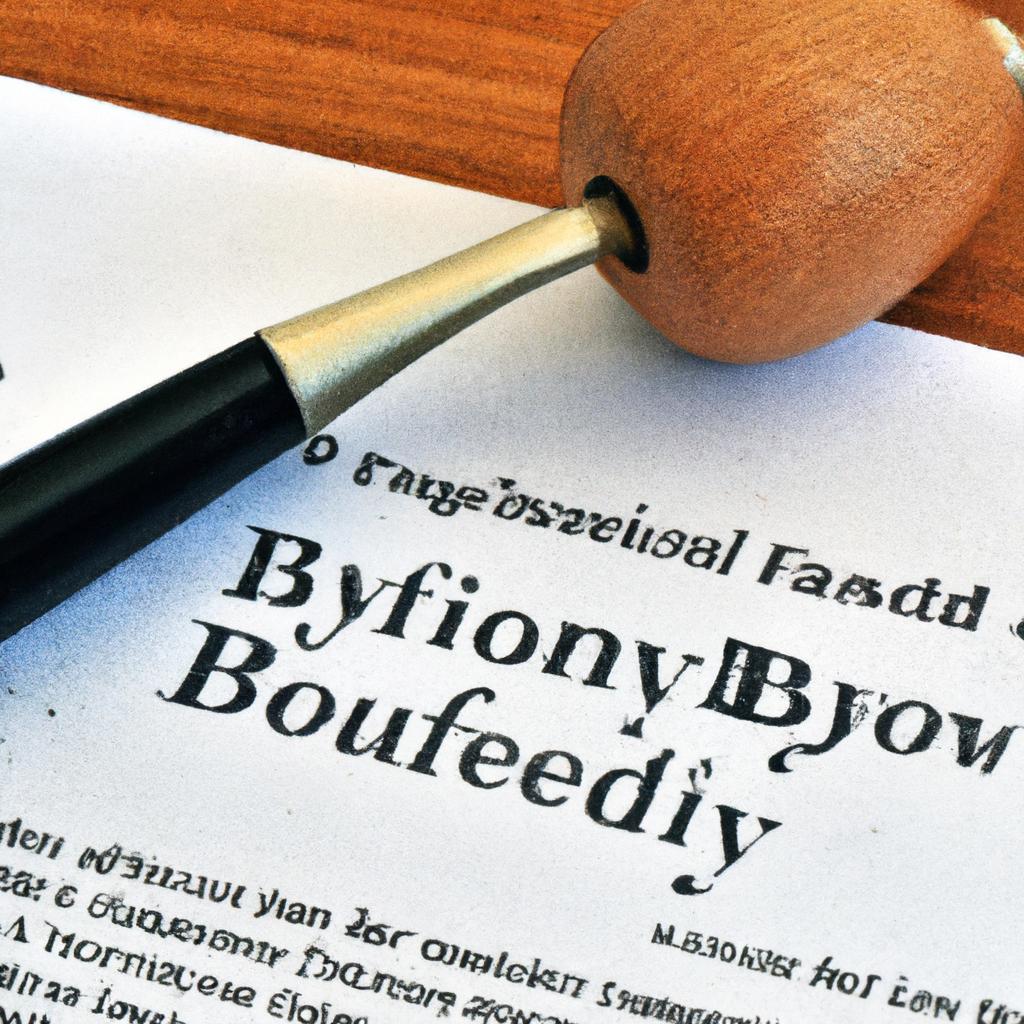In the intricate world of estate planning and probate, the concept of a fiduciary bond is not merely a formality, but a crucial safeguard ensuring the protection of assets and interests. As seasoned practitioners in the realm of trusts and Wills, the team at Morgan Legal Group in New York City is well-versed in the nuanced complexities of fiduciary bonds. Join us as we unravel the intricacies of this essential legal instrument and shed light on its vital role in safeguarding the interests of beneficiaries and estate administrators alike.
Understanding Fiduciary Bonds in Estate Planning
When it comes to estate planning, understanding fiduciary bonds is essential. A fiduciary bond, also known as a probate bond or executor bond, is a type of insurance that protects the beneficiaries of an estate in case the executor or trustee fails to fulfill their duties properly. This bond provides financial security and peace of mind to those involved in the estate planning process.
**Key aspects of fiduciary bonds:**
– Fiduciary bonds are required by the court to ensure that the executor or trustee carries out their responsibilities ethically and responsibly.
- The bond is a guarantee that the estate will not suffer financial loss due to the executor’s misconduct or negligence.
– Fiduciary bonds are typically based on a percentage of the estate’s total value, determined by the court.

The Role of a Fiduciary in Protecting Assets and Interests
When it comes to protecting assets and interests, a fiduciary plays a critical role in ensuring that an individual’s financial affairs are managed and safeguarded with the utmost care and responsibility. A fiduciary is a trusted individual or entity who is legally obligated to act in the best interests of their clients or beneficiaries. This duty of loyalty and trust is the cornerstone of the fiduciary relationship and is essential in safeguarding assets from potential misuse or mismanagement.
One key tool that a fiduciary often utilizes to provide further assurance of their commitment to protecting assets is a fiduciary bond. A fiduciary bond is a type of insurance policy that serves as a financial guarantee for the beneficiaries or clients of the fiduciary. In the event of any mismanagement or misconduct on the part of the fiduciary, the bond provides a form of recourse for the beneficiaries to recover any losses incurred. This additional layer of protection underscores the importance of the fiduciary’s role in upholding their duty to act in the best interests of those they serve.

Key Considerations When Choosing a Fiduciary Bond
When choosing a fiduciary bond, there are several key considerations that must be taken into account to ensure that you are making the best decision for your situation. One important factor to consider is the amount of coverage that the bond provides. It is essential to evaluate the financial responsibilities of the fiduciary and select a bond that offers adequate coverage to protect against potential losses.
Another crucial consideration is the reputation and financial stability of the bonding company. It is essential to work with a reputable bonding company that has a strong track record of providing reliable and trustworthy services. Additionally, you should carefully review the terms and conditions of the bond to ensure that you fully understand your rights and obligations as a bonded fiduciary.

Best Practices for Managing Fiduciary Bonds in Trusts and Wills
Fiduciary bonds are a crucial component of trusts and wills, serving as a form of financial security to protect beneficiaries from potential losses stemming from the actions of a trustee or executor. These bonds are essentially insurance policies that guarantee the faithful performance of fiduciaries in managing the assets and affairs of the trust or estate. As such, understanding the intricacies of fiduciary bonds is essential for ensuring the proper administration of trusts and wills.
When it comes to managing fiduciary bonds in trusts and wills, there are several best practices that can help trustees and executors navigate this complex area of estate planning effectively. These practices include:
- Thoroughly vetting fiduciaries: Before appointing a trustee or executor, it is crucial to conduct a comprehensive background check to ensure their reliability and trustworthiness.
- Regularly reviewing and updating bonds: As the value of the assets in the trust or estate fluctuates, it is important to regularly review and update the fiduciary bond to ensure adequate coverage.
- Seeking professional guidance: Given the legal and financial implications of fiduciary bonds, it is advisable to consult with an experienced estate planning attorney to navigate this process effectively.
Q&A
Q: What is a fiduciary bond and why would someone need one?
A: A fiduciary bond is a type of insurance bond that protects beneficiaries in cases where a fiduciary fails to fulfill their duties.
Q: Who typically requires a fiduciary bond?
A: Fiduciary bonds are commonly required for trustees, executors, guardians, and other individuals responsible for managing someone else’s assets.
Q: How does a fiduciary bond work?
A: If the fiduciary breaches their duties or acts in a fraudulent manner, the bond can provide financial compensation to the affected party.
Q: Are fiduciary bonds mandatory?
A: In some cases, yes. Courts or governing bodies may require individuals to obtain a fiduciary bond as a condition of serving in a fiduciary role.
Q: How much does a fiduciary bond cost?
A: The cost of a fiduciary bond can vary depending on factors such as the bond amount, the fiduciary’s credit history, and the specific requirements of the jurisdiction.
Wrapping Up
In conclusion, understanding what a fiduciary bond is can provide valuable insights into the world of finance and personal relationships. Whether you are seeking to protect your assets or fulfill a legal obligation, having a clear understanding of fiduciary bonds can pave the way for a successful and secure future. Remember, trust and responsibility go hand in hand when it comes to navigating the complex web of financial agreements. So, next time you hear the term “fiduciary bond”, you can confidently say that you know exactly what it means.
 A fiduciary bond, also known as a surety bond, is a type of insurance that protects the assets of a beneficiary in the event that a fiduciary, such as a trustee or executor, fails to perform their duties or commits fraud. This bond ensures that the beneficiary will be protected and compensated for any losses caused by the fiduciary’s actions. Understanding the details and importance of a fiduciary bond is crucial for anyone involved in trusts, estates, or other fiduciary relationships. In this article, we will delve deeper into what a fiduciary bond is, how it works, and why it is necessary.
A fiduciary bond, also known as a surety bond, is a type of insurance that protects the assets of a beneficiary in the event that a fiduciary, such as a trustee or executor, fails to perform their duties or commits fraud. This bond ensures that the beneficiary will be protected and compensated for any losses caused by the fiduciary’s actions. Understanding the details and importance of a fiduciary bond is crucial for anyone involved in trusts, estates, or other fiduciary relationships. In this article, we will delve deeper into what a fiduciary bond is, how it works, and why it is necessary.
What is a Fiduciary Bond?
A fiduciary bond is a legally binding agreement between three parties: the principal (the fiduciary), the obligee (the beneficiary), and the surety (the insurance company providing the bond). The principal is the individual or entity who is required to obtain the bond, and the obligee is the individual or entity that will benefit from the bond. The surety is the insurer who guarantees that the principal will fulfill their duties.
This type of bond is commonly required by law in various situations where a fiduciary relationship exists. These can include managing a trust, administering an estate, managing investments, or handling the finances of a vulnerable individual or organization. In these situations, the fiduciary has a legal obligation to act in the best interests of the beneficiary, and the bond provides an extra layer of protection for the beneficiary in case the fiduciary breaches their duties.
Types of Fiduciary Bonds
There are several types of fiduciary bonds, and the specific type required will depend on the nature of the fiduciary relationship and state laws. Some common types of fiduciary bonds include:
1. Probate Bonds: These bonds are required when an individual is appointed as an executor or administrator of an estate. They ensure that the executor will properly distribute the assets of the deceased as per the will and state laws.
2. Trustee Bonds: These bonds are typically required when an individual or institution is managing a trust. They provide protection if the trustee mismanages the trust or uses the assets for their own benefit.
3. Guardianship Bonds: In cases where a guardian is appointed to manage the affairs of a minor or incapacitated individual, a guardianship bond may be required. This bond protects the ward’s assets and ensures that the guardian acts in their best interests.
4. Investment Advisor Bonds: Individuals or firms managing investments on behalf of clients may be required to obtain an investment advisor bond. This bond protects investors from any misconduct or negligence by the advisor.
How Does a Fiduciary Bond Work?
After obtaining a fiduciary bond, the principal must perform their duties diligently and in good faith. If the principal fails to do so, the beneficiary can make a claim against the bond to seek compensation for any losses or damages. The surety will investigate the claim and, if found to be legitimate, will pay out the claim up to the bond’s maximum coverage amount.
It is crucial to note that the fiduciary is ultimately responsible for any losses incurred by the beneficiary. The bond is only a means of compensation for the beneficiary and does not relieve the fiduciary of their duties and liabilities. In case of a claim, the surety will require the principal to reimburse them for any amounts paid out.
Benefits of a Fiduciary Bond
Obtaining a fiduciary bond offers numerous benefits to both the fiduciary and the beneficiary. Some of these include:
1. Protection against fraud and negligence: A fiduciary bond ensures that the beneficiary is protected against any fraudulent acts or negligence by the fiduciary. This can include theft or mismanagement of assets, misappropriation of funds, or breach of fiduciary duties.
2. Trust and peace of mind: The bond provides peace of mind to the beneficiary by assuring them that if the fiduciary fails in their duties, they will be compensated for any losses or damages. This helps build trust in the fiduciary relationship and provides a safety net for the beneficiary.
3. Legal requirement: In many cases, obtaining a fiduciary bond is a legal requirement. Failure to obtain the bond can result in legal consequences for the fiduciary, including removal from their role.
Tips for Obtaining a Fiduciary Bond
Here are some essential tips to keep in mind when obtaining a fiduciary bond:
1. Research and compare: Before choosing a bond provider, it is essential to research and compare different companies to find the best coverage and rates.
2. Maintain good credit: Bond underwriters will review the fiduciary’s credit history when determining the bond cost. Maintaining good credit can help lower the bond’s premium.
3. Understand the bond terms: It is crucial to understand the terms of the bond, including the coverage amount, what acts are covered, and any exclusions or conditions.
4. Notify the surety of any changes: If there are any changes in the fiduciary relationship, such as a change in the principal or beneficiary, it is essential to notify the surety to avoid any potential issues with the bond’s validity.
In Conclusion
A fiduciary bond is a valuable tool for protecting the assets and interests of beneficiaries in fiduciary relationships. By understanding what a fiduciary bond is, how it works, and the benefits it offers, you can ensure that you fulfill your duties as a fiduciary while providing peace of mind to your beneficiaries. If you are unsure if you need a fiduciary bond, consult with a legal or financial advisor to assess your specific situation.

